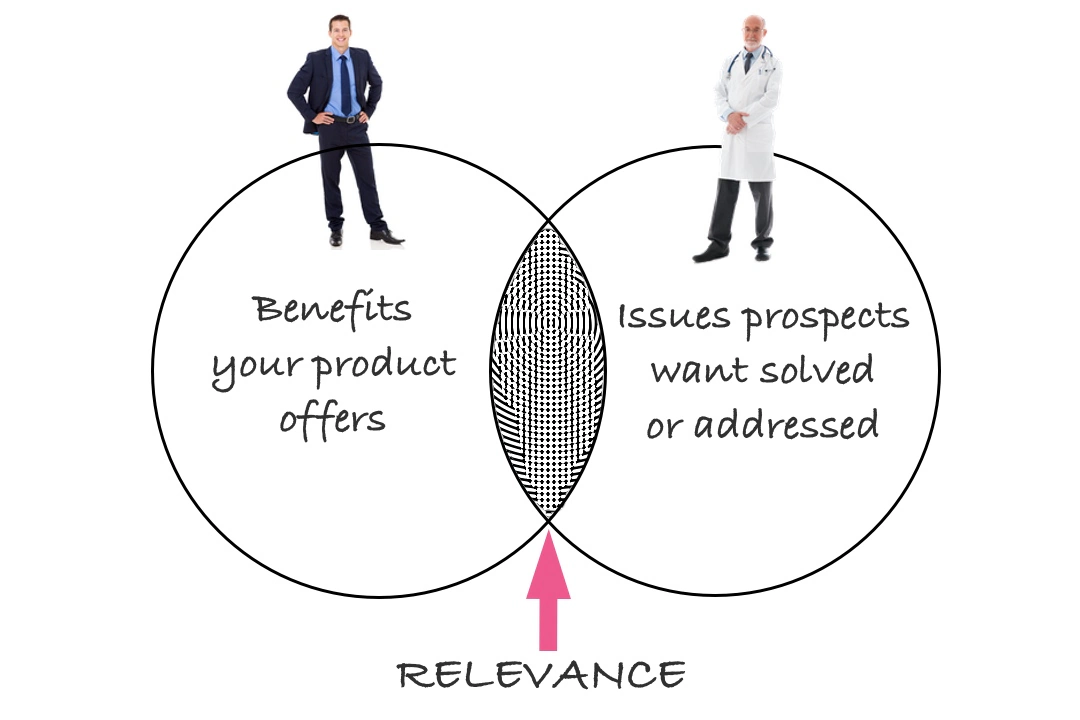Exposing Hidden Medical Sales Opportunities In The Pandemic
Exposing Hidden Medical Sales Opportunities In The Pandemic
Applying The Power of Real-time Relevance to Sell More
The COVID-19 crisis has been a major disrupter for medical sales professionals. It’s reduced access to accounts and decision-makers, caused the cancellation of healthcare visits and procedures, froze equipment budgets and realigned priorities for healthcare professionals and institutions. Yet some savvy medical reps are uncovering hidden medical sales opportunities during the pandemic leading to more business than ever before. I call this the pandemic paradox.
Crisis, by definition, presents challenges and difficulties, but it almost always carries new opportunities as well. Many of these opportunities can be turned into sales by applying one simple concept: Relevance.
Relevance has been the key to unlocking closed doors during the COVID-19 crisis. Sales reps focused on addressing current, pandemic-related top-of-mind issues are getting attention and serious consideration.
The mistake most medical reps seem to be making is continuing to sell like it’s still 2019. These reps are finding that this approach rarely gets them through the hospital or practice door. Even when it does, they’re not finding many customers in a buying mood.
Selling Relevance in Healthcare
All medical sales representatives talk features and benefits, but far too many leave it to customers to determine how a product might be relevant to any real-time, urgent needs. It’s not the customer’s job to make this connection on their own; it’s the salesperson’s job to guide them.
A key question to ask before any sales contact is this:
“How do I make my product, my company, and myself relevant — NOW— based on the circumstances accounts/customers and patients may be experiencing?”
Identifying real-time relevant value is not a one and done effort; it’s a skill to apply before every sales contact. Relevance is a moving target that not only changes from day to day, but from moment to moment. Success lies in a salesperson’s ability to identify and address each stakeholder’s relevant needs and concerns at the moment of contact.
Beware The Assumption of Relevance
A product or service is relevant only when it adds value. It’s a mistake to assume a prospect will automatically value a product based on their specialty or title.
Let me give you an example…
Let’s say a salesperson sells a synthetic bone graft substitute used in the surgical treatment of fractures by orthopedic surgeons. It’s easy to make this assumption: “This doctor is an orthopedic surgeon, therefore my product is relevant.” The entire sales approach is likely to reflect this assumption.
Suppose this salesperson is calling on an orthopedic trauma surgeon —someone who seems to be an ideal prospect because trauma surgeons do a lot of bone grafting. After a cursory greeting, the salesperson launches into a description of the product, the science behind it and makes some claims as to its superior ability to heal difficult fractures. The salesperson’s entire presentation is based on an assumption of relevance. Who wouldn’t assume relevance for a surgeon who uses bone graft on a regular basis, right?
Not so fast…
What if the surgeon is a big advocate of using a patient’s own bone for grafting whenever possible instead of using synthetic graft? Is the synthetic product relevant to the surgeon and his practice? Considering the surgeon’s mindset, the answer is probably not. That’s not to say there won’t be situations where the surgeon might consider it, but without additional context, it’s likely no go.
What about if the salesperson is calling on a different surgeon who uses synthetic bone graft routinely? Is the product relevant now? It might be potentially more relevant than with the previous surgeon, but then again, it might not.
Let’s say this surgeon has been using a competitor’s synthetic bone graft product for years. He knows the science inside and out. He’s worked through the learning curve with the product and knows how to achieve the best possible outcomes. Will he automatically value a competing product just because it’s in the same product category? Not if he perceives the product as essentially the same. Unless the new product addresses one or more relevant issues not addressed by his current choice, the surgeon won’t see additional value and therefore it won’t be relevant.
The vast majority of medical reps are guilty of assumptive product positioning like I just described. Sure, this works occasionally, but to healthcare professionals who are already overwhelmed and distracted, they’re likely to commoditize a product (consider it essentially the same as any other product) to dismiss it.
During crisis, a sales approach should convey, “I want to understand your situation and share information that might be useful.” Instead, most reps default to a canned, product-focused sales approach says, “I’m here to talk about what’s relevant to me—making a sale!”

Moving From No Access to Getting Appointments and Sales
Access to customers and accounts during the COVID-19 crisis has been challenging for most salespeople. Many reps have attempted virtual (video) sales calls in hopes of bridging the access issue. Those who succeeded, using either virtual or blended sales calls (a blend of virtual and in-person selling), did so by demonstrating relevance. Virtual selling can be very effective, but it’s little more than a means of communication. What truly matters, whether selling in-person or virtually, is relevance.
Simply put, product relevance is the overlap of the benefits your product can provide and the issues a prospect wants solved or addressed (see diagram above).
During my workshops and coaching sessions over the last year, I taught my Real-time Relevance-Based Selling™ (RTRBS™ ) approach. Participants learned to work through an algorithm I developed to identify potential real-time relevant issues their products could address. They then learned how to use RTRBS™ to gain access and conduct a virtual or in-person sales call.
The main strategy was to tie product benefits to addressing an issue related to the pandemic. These were issues where prospects knew they needed a solution that they wanted to discuss. Some examples are addressing infection control issues for patients and staff, reducing the number of in-person patient visits, shortening patient encounters, and countless more.
Most sales reps who applied this strategy reported improved results almost immediately. Prospects who declined sales call requests previously were showing interest. In fact, a high percentage of them agreed to a conversation on the spot when they were approached with a potentially real-time relevant issue.
The only real change from previous sales approaches (other than conducting sales calls virtually in most situations) was identifying and focusing on an issue that was important to the prospect at that moment. In other words, focusing on issues that are real-time relevant.
Did this approach lead to more sales? Yes, even when accounts deferred buying previously. Here’s why:
During times of crisis and extreme need, those offering relevant solutions get pushed to the front of the line.
In a world where typical medical reps rely on scripted sales pitches and powerpoint slides, identifying and leveraging real-time relevance is almost a superpower. Real-time issues-based selling delivers a true competitive advantage by addressing what’s on prospects’ minds at the time of contact. It grabs attention, gets sales representatives in the real or virtual door, and allows them to position products and services as ideal solutions instead of commodities.
Find the hidden sales opportunities in your accounts by identifying and focusing on the real-time relevant issues that your products address. Be relevant!
Learn How Your Sales Team Can Sell More
Schedule a complimentary call with Mace to discuss proven strategies to help your sales team overcome obstacles and sell more during this rare window of opportunity.

@ 11:52 am
Very interesting article. I just reshared it on my LinkedIn page now. see it here please:
https://www.linkedin.com/posts/draliamohamedi_medical-sales-marketing-activity-6788790229118578688-swJK
@ 2:22 pm
Thank you for sharing the article, Ali. I hope your followers enjoy the power of this strategy.
@ 10:03 pm
Great article Mace! Just shared it as well.
@ 3:07 pm
Mace,
Great article on relevance
In my field, COVID-19 has put a bright light on weight management. The COVID-“19” weight gain by patients, the risk factors associated with it
Obesity’s morbidity and mortality and the financial loss felt by provider groups has helped Ideal Protein become much more relevant recently.
Your Medical Sales Academy has been an eye opener, even to one involved in healthcare for 36 years and healthcare sales for 12.
Thank you.
@ 9:40 am
Really great article – will share this! As always – you are spot on.
Thank you.